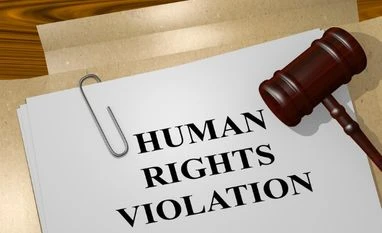Ahead of India's quadrennial review by the UN's human rights body, a rights group has said the international community should call on India to stop targeting non-governmental organisations (NGOs) for criticising the government and demanded action for prosecuting vigilante attacks on minorities.
The UN Human Rights Council (UNHRC) will conduct its third review of India's human rights record under the Universal Periodic Review (UPR) procedure on May 4 in Geneva.
Ahead of this, a submission by the Human Rights Watch (HRW) highlighted the Indian government's "abuse" of overly broad laws to clamp down on NGOs and on the right to freedom of expression.
"The UN review comes at a time when freedom, long- cherished in India are seriously being challenged and critics are increasingly under attack," said Meenakshi Ganguly, South Asia director at HRW.
"UN member countries should raise alarm bells that India's proud history of respect for peaceful dissent crucial for protecting the poor and vulnerable is at real risk," Ganguly said.
The global rights group said UN member countries should, as a matter of urgency, flag concerns over the "arbitrary use" of the Foreign Contribution Regulation Act (FCRA) to restrict foreign funding for NGOs, which a UN special rapporteur concluded was "not in conformity with international law, principles, and standards".
In October 2016, the governmentrefused to allow foreign funding for at least 25 NGOs, including several human rights groups and those defendingthe rights of the most marginalised.
More From This Section
Finance Minister Arun Jaitley had said in New York last week that doing "good work" as a civil society organisation does not give the NGOs any immunity to work outside the law.
He had said that FCRA guidelines require NGOs, which get funding through a particular mechanism, to use the funds for that particular purpose only.
However, data has been released as to the extent of how many organisations did not follow that process, he had said.
"Peaceful critics of the government have been charged with serious crimes such as sedition. There have been numerous incidents of violence against members of Dalit, Muslim, tribal, and Christian communities," it said, adding thatHindu vigilante groupshave killed at least 10 Muslims in separate incidents across the country since 2015 over suspicions that they killed, sold, or bought cows for beef. Churches were attacked in several states in 2015.
"India likes to point to its courts as the ultimate defender of human rights in the country, but the government has often ignored judicial orders for police reform or security force accountability," Ganguly said.
"UN member countries should impress upon India that it should treat the UN review as an opportunity for honest reflection and to carve a way forward," he said.
The rights group noted that since its last review in 2012, the Indian government has taken some positive steps, including amending its criminal laws to strengthen legal response to sexual assault against women and enacting new laws to protect rights, including to prosecute child sex abuse and to end the degrading and inhuman practice of "manual scavenging", the cleaning of human excreta by hand.
The group expressed concern that security forces and public officials remain largely unaccountable for serious human rights abuses.
The Universal Periodic Review (UPR) is a unique mechanism of the Human Rights Council (HRC) aimed at improving the human rights situation on the ground of each of the 193 UN member states.
)